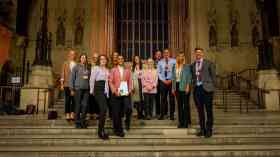
Make this the summer of computing
The pandemic has shown just how much digital skills and computing are now a vital part of education – and are increasingly in demand from employers. Teachers can get ahead this summer with the NCCE’s Summer of Computing, which is an opportunity for teachers to develop their computing skills
Written by Victoria Temple, Community engagement officer, NCCE
The Summer of Computing programme has brought together the NCCE’s short courses, full-day CPD, and residential summer schools delivered online and face-to-face in venues across England through July and August.
The focus is on enabling teachers to deliver the digital skills that will be vital for post-covid recovery and that have been in the spotlight through this past year. ICT and computing skills are increasingly in demand, both within an education setting and in the wider economy.
“We’re thrilled that face-to-face courses are back – especially our August summer schools which proved so popular last year. But we’re also aiming to make access to training as convenient as we can with a wide range of online courses too,” said Prof Simon Peyton Jones, Chair of the NCCE.
Supporting secondary teachers
The NCCE’s main offering for secondary teachers is its Computer Science Accelerator (CSA) programme which develops the subject knowledge needed to teach computer science up to GCSE level.
It is designed for teachers who are newcomers to the subject as well as those with a computing background. More than 4,300 teachers have now received training through the CSA. It’s a programme which has continually evolved since its launch in 2019 to meet the needs of teachers. This year CSA in the Summer is a key part of the wider Summer of Computing event.
“Following the success of last year’s CSA in the Summer, we have extended our provision,” said, Steve Clarke, CSA Programme Manager at the NCCE.
“This year CSA in the Summer is back bigger than ever. With five pathways to choose from, and summer schools taking place across the country, there’s something for all abilities, from beginner to advanced level.
“Our summer schools also offer face-to-face events for our beginner, intermediate and advanced tracks. We have courses across the country including Southampton, High Wycombe and York. Any of our courses taking place at the National STEM Learning Centre in York are residential, and include free accommodation.”
Rohini Shah, who teaches at Queens Park Community School in London, is one of the 4,300 teachers who have received training via the CSA.
“I love bringing in new initiatives and pedagogy to our school and in all honesty our department is considered cutting edge!” she said.
“QPCS has been moving from strength to strength in teaching computer science to our students. However, to refresh my skills and have access to new materials I joined the CSA programme.
“I enjoyed doing the courses because they gave me new insight and pedagogy, and more confidence in my teaching techniques, which in turn benefits your students. Computing can be a tough subject to teach as it is so fast-moving, but we exceed the national grades boundaries with our students.”
Boosting confidence
It’s not only secondary teachers who can benefit; the Summer of Computing includes courses to develop skills for primary teachers too.
Will Rogers is programme manager for the NCCE, based at STEM Learning, one of the NCCE’s three consortium partners.
“Our courses give primary teachers the confidence to inspire young pupils, boosting their enjoyment and long-term engagement with computing,” said Will.
“New for 2021, the NCCE’s Summer of Computing primary programme includes a range of remote and face-to-face courses which really help to boost teachers’ skills.
“The aim is to teach the essential subject knowledge and pedagogy to become a skilled teacher of primary computing, confident to teach key concepts such as algorithms and programming, to all ages of children.”
The NCCE’s live remote summer courses include Primary programming and algorithms and Introduction to primary computing and there are online and face-to-face courses in assessment of computing at venues across England.
James Jerrold, who teaches primary computing in Buckinghamshire, said the NCCE courses provided the “time and space to ask questions and explore ideas.”
He added: “The courses are informative and teachers receive practical ideas which can be easily adapted to their own setting.”
Holly Newell, teacher and computing subject leader at a primary school in Leicester, agreed. “The courses have been invaluable to me as a subject leader. I’ve developed my own subject knowledge and been able to engage all learners in exciting computing lessons. I’ve gained confidence in many new skills and have cascaded these concepts down to staff and pupils.”
Wendy Heide is a Year 2 class teacher and Computing Lead at Abbeyfields First School in Morpeth, Northumberland.
She said; “Not only have we been able to identify training needs within our staff and pick and choose relevant content, but we’ve also had the opportunity to up-skill our current knowledge through learning about new concepts and teaching ideas.”
A level boosters
It’s not only teachers who can benefit from CPD through the summer: the Summer of Computing includes special events also running for Y11 students looking at studying A level Computing.
Isaac Computer Science is running a special series of booster events for Year 11 students between 1-9 July. Each session is directly linked to a topic available on Isaac, with more material available to explore in more depth after the event so that they can experience a taste of what’s to come for A level.
The Summer of Computing aims to be fun and engaging, inspiring teachers, and students, for the new academic year.
As Steve Clarke said: “It’s been a challenging year for everyone in education but we’re looking forward to a new academic year and supporting teachers to build skills for 2021/22 and beyond!”
Latest News
23/09/2025 - 10:18
The Education Committee has released a new report outlining ways the government can achieve its mission of economic growth by investing in the further education (FE) and skills sector.
22/09/2025 - 11:15
Premier League Primary Stars is offering a new set of free teaching resources aimed at making football and PE lessons more inclusive, especially for girls, who remain less likely than boys to participate in sport.
19/09/2025 - 14:07
A number of school leaders under union NAHT have expressed strong opposition to Ofsted’s planned new inspection framework, with an overwhelming majority backing industrial action if the reforms go ahead as planned.
18/09/2025 - 09:33
A new report has been released which shines a light on the challenges young carers face in England’s education system, focusing on their disproportionately high rates of suspensions.







